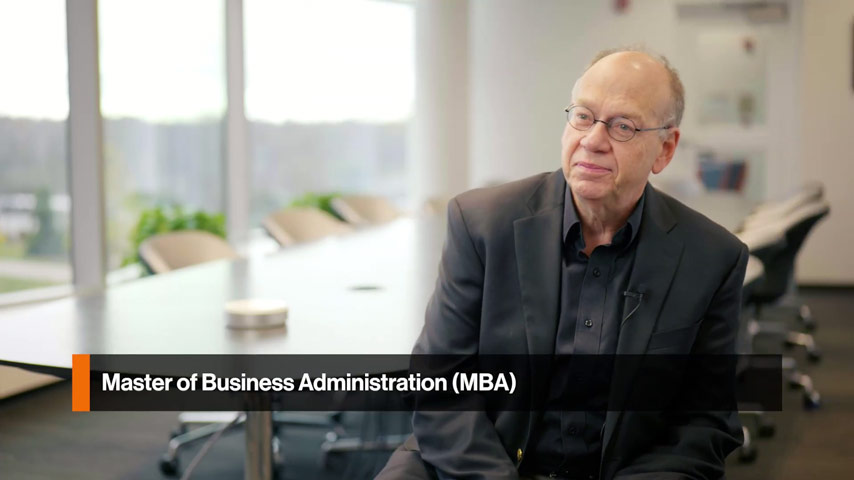Business Administration Master of Business Administration (MBA) Degree


Business Administration
Master of Business Administration (MBA) Degree
- RIT /
- Saunders College of Business /
- Academics /
- Business Administration MBA
Request Info about graduate study
Visit
Apply
Saunders College of Business
RIT’s master’s in business administration prepares you for leadership positions with a strong focus on technology, strategy, entrepreneurship, and data analytics.
Overview for Business Administration MBA
Why Study Business Administration at RIT?
- Position professionals to move into leadership positions in business, industry, and the not-for-profit sectors
- Develop and apply a broad array of management tools and knowledge valued in every kind of organization
- Strong technology core courses with a wide array of technology electives across RIT colleges
- Faculty provide a balance of industry experience and publications in elite research journals
The master’s in business provides a broad base of knowledge and skills that are applicable to every industry. Core courses allow you to develop transferable skills highly valued in every kind of organization. In our MBA degree, you will build knowledge and skills in elective courses that directly apply to your specific career goals. RIT’s master’s in business positions professionals to move into leadership positions in business, industry, and the not-for-profit sector and government.
Program Director William Dresnack discusses the MBA program
RIT’s MBA Resources
At the intersection of business and technology, Saunders provides access to vast resources. Students can utilize state-of-the-art facilities such as the Simone Center for Innovation and Entrepreneurship; the SHED, featuring flexible maker spaces that foster and stimulate creativity, collaboration, and discovery; Venture Creations, RIT's business incubator showcasing our vibrant entrepreneurial culture; and MAGIC Center, for digital media research and production, featuring MAGIC Spell Studios. Through courses and resources, business students study alongside student and faculty artists, designers, engineers, and scientists.
Industry advisory board members and a large worldwide network of over 140,000 RIT alumni connect students to employers in meaningful ways through capstone projects, mentorships, guest speakers, career fairs, and a vast co-op program.
Plus, as a globally diverse university, RIT helps you immerse yourself with an international student body and global campuses in China, Croatia, Dubai, and Kosovo.
Join us for Fall 2024
Many programs accept applications on a rolling, space-available basis.
Online Graduate Information Sessions
Join us to learn how graduate business programs at RIT help further your career objectives.
30% Tuition Scholarship for NY Residents and Graduates
Now is the perfect time to earn your Master’s degree. If you’re a New York state resident with a bachelor’s degree or have/will graduate from a college or university in New York state, you are eligible to receive a 30% tuition scholarship.
Careers and Experiential Learning
Typical Job Titles
| Advertising Account Executive | Business Analyst and Accountant |
| Business Development Associate | Business Intelligence Solutions Analyst |
| Capital Markets Equity Research Associate | Data Engineer |
| Digital Marketing Specialist | Director of Technology and Cloud Solutions |
| GPS Consulting Analyst | Investment Banking Analyst |
| Junior Consultant | Logistics Coordinator |
| Operations Analyst | Product Analyst |
| Project Manager | Risk Advisory Associate |
| Search Engine Optimization Specialist | Social media marketing strategist |
| Technical Project Manager | Technology Analyst |
What can you do with an MBA?
The flexibility of our master of business administration means our graduates are prepared for outstanding career opportunities in a range of positions. Our alumni are employed at diverse firms such as Anheuser-Busch, Bank of New York Mellon, Cardinal Innovations Healthcare, Citi, Datto Inc., Deloitte, IBM, KPMG LLP, Paychex, PricewaterhouseCoopers, REDCOM Laboratories, Inc., Thermo Fisher Scientific, TJX Companies, Tyco Electronics, and more. Our Management Advisory Board helps students prepare for their careers by ensuring the curriculum is continuously updated to meet employers needs while providing networking and mentorship opportunities.
Cooperative Education and Internships
What makes an RIT education exceptional? It’s the ability to complete relevant, hands-on career experience. At the graduate level, and paired with an advanced degree, cooperative education and internships give you the unparalleled credentials that truly set you apart. Learn more about graduate co-op and how it provides you with the career experience employers look for in their next top hires.
Co-ops and internships take your knowledge and turn it into know-how. Business co-ops provide hands-on experience that enables you to apply your knowledge of business, management, finance, accounting, and related fields in professional settings. You'll make valuable connections between course work and real-world applications as you build a network of professional contacts.
Cooperative education in the MBA program is optional, but encouraged. Academic credit is not granted, but formal recording of the co-op experience is made on the student’s transcript. Students in good academic standing are eligible for co-op after completing the foundation course, and a substantial portion of their concentration courses. They also must attend a series of co-op and career services workshops. RIT does not guarantee co-op placements.
Featured Work
Research Insights: To pay or not to pay?
Chun Keung Hoi
The reputational effects of tax avoidance strategies
Research Insights: Accounting conservatism and qualitative disclosures
Ashok Robin, Kean Wu
Study explores the benefits of reporting bad news early
Research Insights: Chinese media sets tone for polluters
Zhi Tang
The mediating role of the government and public in agenda setting
Featured Profiles
M&T Bank, Buffalo, NY
Ashley Walker ’07
"RIT has a strong reputation both domestically and internationally, which helps when applying for roles. The career staff and career matching website also support placement for co-ops, internships,...
Cleveland Cavaliers, Cleveland, OH
Ken Radzyminski ’15
"Outside of the classroom, I was able to collaborate with students from multiple colleges and educational backgrounds to give a more realistic approach to real-world application."
AcuteKids Pediatric Urgent Care, Rochester, New York
Chrysa Charno ’09
"I grew up working for my mother and watching what it took to run a successful business. RIT helped me understand those concepts in depth and allowed me to develop relationships that have provided...
Curriculum for 2023-2024 for Business Administration MBA
Current Students: See Curriculum Requirements
Business Administration, MBA degree, typical course sequence
| Course | Sem. Cr. Hrs. | |
|---|---|---|
| First Year | ||
| ACCT-603 | Accounting for Decision Makers A graduate-level introduction to the use of accounting information by decision makers. The focus of the course is on two subject areas: (1) financial reporting concepts/issues and the use of general-purpose financial statements by internal and external decision makers and (2) the development and use of special-purpose financial information intended to assist managers in planning and controlling an organization's activities. Generally accepted accounting principles and issues related to International Financial Reporting Standards are considered while studying the first subject area and ethical issues impacting accounting are considered throughout. (This class is restricted to degree-seeking graduate students or those with permission from instructor.) Lecture 3 (Fall, Spring, Summer). |
3 |
| DECS-743 | Operations and Supply Chain Management Study of the management of operations and supply chain management. Encompasses both manufacturing and services. Topics include operations and supply chain strategy, ethical behavior, forecasting; work systems, inventory management, capacity and materials planning, lean operation, supply chain design and closed-loop supply chains, global operations, quality management, quality control, and quality improvement, project management; and current issues. (Prerequisites: DECS-782 or MGIS-650 or equivalent course.) Lecture 3 (Fall, Spring, Summer). |
3 |
| ESCB-705 | Economics and Decision Modeling The course focuses on the fundamental economic theories most useful for the management of a firm in a global environment. Microeconomic theories and current events are used to explain the performance of the market system and help managers formulate effective pricing and business decisions. Macroeconomic theories and current events are used to explain the direction of the domestic and global economy to help managers understand the implications, including foreign direct investment, for their companies. Students will learn to explain and predict changes in economic growth, inflation, interest rates, international trade and foreign exchange rates. (This class is restricted to degree-seeking graduate students or those with permission from instructor.) Lecture 3 (Fall, Spring, Summer). |
3 |
| FINC-721 | Financial Analysis for Managers An examination of basic financial theories, techniques, and practices. Topics include: time value of money, valuation, capital asset pricing, risk and diversification, cost of capital, capital budgeting techniques and spreadsheet analysis. (Prerequisites: ACCT-603 or equivalent course.) Lecture 3 (Fall, Spring). |
3 |
| MGIS-650 | Introduction to Data Analytics and Business Intelligence This course serves as an introduction to data analysis including both descriptive and inferential statistical techniques. Contemporary data analytics and business intelligence tools will be explored through realistic problem assignments. Lecture 3 (Fall). |
3 |
| MGMT-740 | Leading Teams in Organizations This course examines why people behave as they do in organizations and what managers can do to improve organizational performance by influencing people's behavior. Students will learn a number of frameworks for diagnosing and dealing with managerial challenges dynamics at the individual, group and organizational level. Topics include leadership, motivation, team building, conflict, organizational change, cultures, decision making, and ethical leadership. Lecture 3 (Fall, Spring, Summer). |
3 |
| MGMT-775 | Ethical Decision Making and Corporate Social Performance This course is designed to equip business practitioners with scientifically supported frameworks and methods for recognizing, analyzing, deciding on, and implementing ethical courses of action in business. Selected topics include stakeholders needs analysis, the science of decision-making, corporate social performance, issues involved with emerging technologies, and doing business in a global context. Lecture 3 (Fall, Spring). |
3 |
| MKTG-761 | Marketing Concepts and Commercialization An introduction to contemporary principles and practices of marketing. The course is structured around the process of marketing planning leading to the development of successful marketing strategies, including the commercialization of products and services in domestic and international environments. Focus is on environmental scanning techniques, setting and evaluating measurable objectives, innovating and controlling the interrelated components of product/service offering, planning and executing the marketing mix (channels of distribution, price, and promotion), and enhancing customer relationships through the delivery of customer value. Lecture 3 (Fall, Spring, Summer). |
3 |
| Second Year | ||
STEM Electives |
9 | |
Open Graduate Electives |
6 | |
| MGIS-735 | Design and Information Systems Students who complete this course will understand the principles and practices employed to analyze information needs and design appropriate IT-based solutions to address business challenges and opportunities. They will learn how to conduct requirements analysis, approach the design or redesign of business processes, communicate designs decisions to various levels of management, and work in a project-based environment. Lecture 3 (Spring). |
3 |
| MGMT-735 | Management of Innovation This course addresses the management of innovation, sustainable technology, and the importance of technology-based innovation for the growth of the global products and services industries. The course integrates three major themes: (1) leading-edge concepts in innovation, (2) the role of technology in creating global competitive advance in both product-based and services-based industries, and (3) the responsibility of businesses related to sustainability. The importance of digital technology as an enabler of innovative services is covered throughout the course. (completion of four graduate business courses) Lecture 3 (Fall, Spring, Summer). |
3 |
| MGMT-759 | Competitive Strategy This course reviews the techniques and tools firms use to create a sustainable competitive advantage in the global economy. Cross-functional analysis is a core element in the course. Topics covered include the mission and vision of the firm, analysis of the external environment, analysis of internal resources and capabilities, the role of innovation in strategy development, analysis of global business strategies, developing and implementing business-level and corporate-level strategies, and managing strategy in the multi-business corporation. *Note: All MBA core courses. (Prerequisites: ACCT-603 and DECS-743 and ESCB-705 and FINC-721 and MGIS-650 and MKTG-761 or equivalent courses.) Lecture 3 (Fall, Spring, Summer). |
3 |
| Total Semester Credit Hours | 48 |
|
STEM Electives
Current Students: Contact your Academic Advisor to select STEM Electives.
Admissions and Financial Aid
This program is available on-campus only.
| Offered | Admit Term(s) | Application Deadline | STEM Designated |
|---|---|---|---|
| Full‑time | Fall, Spring, or Summer | Rolling | Yes |
| Part‑time | Fall, Spring, or Summer | Rolling | No |
Full-time study is 9+ semester credit hours. Part-time study is 1‑8 semester credit hours. International students requiring a visa to study at the RIT Rochester campus must study full‑time.
Application Details
To be considered for admission to the Business Administration MBA program, candidates must fulfill the following requirements:
- Complete an online graduate application.
- Submit copies of official transcript(s) (in English) of all previously completed undergraduate and graduate course work, including any transfer credit earned.
- Hold a baccalaureate degree (or US equivalent) from an accredited university or college.
- A recommended minimum cumulative GPA of 3.0 (or equivalent).
- Submit a current resume or curriculum vitae.
- Submit a personal statement of educational objectives.
- Letters of recommendation are optional.
- Entrance exam requirements: GRE or GMAT required for individuals with degrees from international universities. No minimum score requirement.
- Writing samples are optional.
- Submit English language test scores (TOEFL, IELTS, PTE Academic), if required. Details are below.
English Language Test Scores
International applicants whose native language is not English must submit one of the following official English language test scores. Some international applicants may be considered for an English test requirement waiver.
| TOEFL | IELTS | PTE Academic |
|---|---|---|
| 88 | 6.5 | 60 |
International students below the minimum requirement may be considered for conditional admission. Each program requires balanced sub-scores when determining an applicant’s need for additional English language courses.
How to Apply Start or Manage Your Application
Cost and Financial Aid
An RIT graduate degree is an investment with lifelong returns. Graduate tuition varies by degree, the number of credits taken per semester, and delivery method. View the general cost of attendance or estimate the cost of your graduate degree.
A combination of sources can help fund your graduate degree. Learn how to fund your degree
Additional Information
4+1 Accelerated MBA
Undergraduate students can get a Master of Business Administration (MBA) in one year after completing an undergraduate degree. This accelerated program allows select core MBA courses to be waived with a combination of specific undergraduate "B" grade or better completed coursework. Each undergraduate course may not be older than five years upon matriculation into the MBA degree program, and must be confirmed upon acceptance into the program.
Latest News
-
April 26, 2024
![Saunders graduates standing in front of tree]()
2023-24 Alumni News and Recognitions
Submit your latest career move or latest achievement to communications@saunders.rit.edu.
-
April 22, 2024
![Student and professor in hallways with Best Graduate Schools from TFE Times, 2024 text]()
Saunders ranks among TFE Times’ top graduate programs
Saunders College of Business at Rochester Institute of Technology received several rankings from TFE Times on their Top Graduate Programs lists for 2024.
-
April 18, 2024
![2023 Vanden Brul Winners with Jacquie]()
2023-24 Accomplishments from Saunders Students
If you are a student at Saunders College and have exciting news to share, email communications@saunders.rit.edu.

























